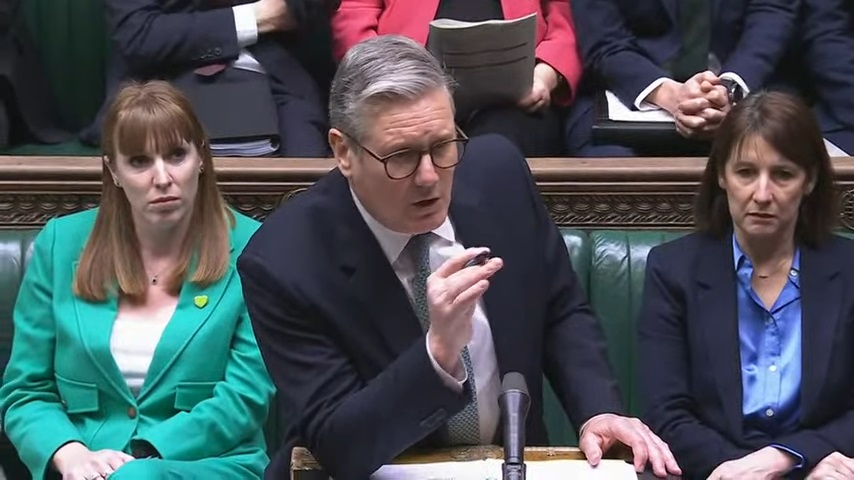When the British Chambers of Commerce gathered members on Wednesday for a meeting with a Treasury minister to discuss the state of the economy and how the government might kickstart growth, they had expected to see Lord Livermore, the financial secretary. Several were surprised when he turned up with Rachel Reeves. Aides say that when the chancellor heard from Livermore who he was seeing, she said: “I’m coming too.”
In the meeting voices were raised against the government’s decision to treat business like a magic money tree in the budget. Those who accompanied Reeves left the meeting very clear what business now wants if the government is serious about growing the economy.
The chancellor heard the same message from the CBI. “In every one of these meetings, the one thing they keep coming back to is regulation,” an ally said. “They think it’s holding them back.”
Rachel Reeves is the most senior British official to visit China since Theresa May when she was prime minister
AARON FAVILA/GETTY IMAGES
Reeves will try to show she has listened this week by “hauling in” a group of Britain’s leading regulators to tell them: “You’ve got to get serious about growth.” The chancellor will tell the Competition and Markets Authority, Ofcom, Ofgem, the Environment Agency and the Financial Conduct Authority: “I want your ideas about how you’re going to stop regulating for risk and go for growth instead.”
She plans to see 16 regulators — half this week and the rest the week after. “Last year the prime minister told them to come up with ideas on how they were going to boost growth,” a Treasury source said. “We need to see them now.” The chancellor hopes to foster “competition amongst them” in the drive for the best ideas.
Advertisement
If this smacks of panic, the Treasury stresses that Reeves started planning in November for a speech on growth at the end of this month. She has known for three months that the Office of Budget Responsibility (OBR) watchdog will deliver a verdict on March 26 about whether she has stuck to the new fiscal rule she unveiled in October’s budget. That decreed that she must balance day-to-day government spending by 2029.
Reeves left herself just £9.9 billion of “headroom” after the budget to stay within these tramlines. On Tuesday, Capital Economics concluded she is £1 billion from the edge. But it can be revealed that the Treasury actually thinks the situation is worse than that. “Treasury officials said to her … that if it was today she would be in the red and would have broken the day-to-day fiscal rule,” a Whitehall insider said. Official Treasury sources would not comment, but pointedly did not deny this claim.

Rachel Reeves looked tired at prime minister’s questions on Wednesday alongside Sir Keir Starmer and Angela Rayner
Those searching for omens will note that Friday marked the 46th anniversary of the Labour prime minister Jim Callaghan flying home from the Caribbean during the winter of discontent to downplay his government’s economic turmoil. The Sun’s headline the next day was “Crisis? What crisis?” — words Callaghan never spoke, but which were hung around his neck for decades.
With apparently similar insouciance, Reeves boarded a plane on Friday for China, where she hopes to announce £600 million in inward investment. Privately, however, sources close to the Treasury say the chancellor is “very depressed” that her reputation for prudence has been so quickly destroyed and they claim “she can’t see a way out”. One source said: “She’s got choices to make and she knows they’re all shit.” At prime minister’s questions on Wednesday, Reeves appeared pale, drawn and tired at Sir Keir Starmer’s side.
The crisis, if that’s what it is, was brought to a head by a two-week sell-off of UK government bonds, known as gilts, which began last week and continues this week. Yields on ten-year gilts rose to 4.7 per cent, the highest this century and higher than in the aftermath of Liz Truss’s disastrous mini-budget in 2022.
Advertisement
The Treasury is right to say that the cost of bonds is rising everywhere, in part because the markets anticipate Donald Trump slapping tariffs on goods after his inauguration on January 20, a move likely to drive up inflation. “It’s a global shift,” a Reeves ally said. “We’ve inherited a really difficult economic picture. The public finances were scorched by the Tories and economic growth has been sluggish for a decade.”
But UK gilt prices are rising further and faster than in other comparable economies and many in the City think Reeves’s decisions since July have made the situation worse, not better. “She has lost credibility with the financial markets,” said a former Downing Street aide who now advises leading businessmen. “They don’t think she knows what she’s doing. They don’t believe a word she says. They don’t believe she has any idea how to fix this.
“Gilt yields are going up across the West but it’s a beauty parade and Britain is regarded as the ugliest duckling you can pick on. People expect the OBR to revise down growth figures and revise up debt.”
Aides say Reeves is not depressed but “determined”. In a meeting of the Treasury’s growth committee on Monday, she said: “This is a reminder of the scale of the challenge we inherited and the urgency in taking action. We need to go further and faster. We’ve got to get this sorted.”
However, allies do not disguise the fact that flatlining growth figures, sticky inflation and a deterioration in the public finances have spread “frustration” in government between Reeves and other ministers. “The things that Rachel has been pushing for are just not happening quickly enough,” said one political confidant. “She’s deeply frustrated about it. She’s demanded that things happen quicker.”
Advertisement
One key focus is changes to the planning rules, which Reeves regards as one of the most effective domestic levers she can pull to stimulate the economy. On Tuesday and Wednesday Reeves met No 10 officials, plus Angela Rayner and Matt Pennycook, the ministers responsible for the planning reforms. She also spoke to Lucy Powell, the leader of the Commons, to ensure that the bill “goes through quickly” once it is introduced. Reeves wants it to get an airing in parliament before the OBR report in March so progress can be demonstrated.
Treasury sources say relations are strong between Reeves and Rayner — the two most senior women in government — and that Rayner and Pennycook are “really good” in their roles and “getting on with it”. But there are clearly frustrations on the political side at foot-dragging by the civil service. “You want to scream: ‘For Christ’s sake, let’s get this going,’ to some of them,” a Whitehall adviser said.
The friction extends to relations with other members of the cabinet. “Not all ministers are taking growth seriously enough,” said a senior figure. “Part of Rachel’s frustration is that the economy is seen as an issue for the Treasury. Getting economic growth is not one department’s job, it’s everyone’s job.”
Reeves has already demanded 5 per cent savings from all departments as part of the comprehensive spending review, which will report in June. The deterioration in the government’s position means it is now highly likely that Reeves will now demand deeper cuts.
This has other ministers worried and angry. “We have responsibilities to deliver manifesto commitments and the Treasury keeps saying ‘No’ to things,” another minister complained. “People trusted Rachel to deliver a solid base on which to build. But it doesn’t seem to be working.”
Advertisement
Reeves has few options. She could tweak her fiscal rule to say she would deliver it at the end of a rolling five-year period, rather than in 2029 — a trick used by George Osborne when he was chancellor. Treasury aides are emphatic this will not happen and, visiting the bicycle-maker Brompton’s Beijing store on Saturday, Reeves declared: “The fiscal rules laid out in the budget are non-negotiable.”
In the budget, Reeves set out a 4.3 per cent increase in spending this year and a 2.6 per cent rise in 2025-26, with budgets only set to increase by 1.3 per cent a year after that. Market watchers say this squeeze in public money towards the end of the parliament was already regarded with huge suspicion by City traders. “For her to go back to markets and say we’ll cut even deeper won’t be credible,” the City adviser said. This seems to be understood by the Treasury. A source close to Reeves said: “It’s what Jeremy Hunt did time and time again. People stopped believing him.”
Reeves has also ruled out further tax rises. That leaves another spending squeeze. Further welfare cuts are being considered, but there are huge pressures. Starmer and Reeves are also under pressure from Trump to set out a timetable to raise defence spending from 2.3 per cent of GDP to 2.5 per cent, something that could cost £20 billion. Trump is actually calling for Nato countries to spend 5 per cent annually. “Rachel Reeves takes Rishi Sunak’s view as chancellor, that the MoD getting £55 billion a year is a very profligate thing,” said a source close to senior commanders.
All this at a time when Starmer has to pick a new chief of the defence staff to replace Admiral Sir Tony Radakin in the autumn. While there have been claims that a retired general could be brought back, the smart money in military circles is that Starmer will pick Dame Sharon Nesmith, the vice-chief of the defence staff and a four-star general, who was the first woman to command an army battalion.

General Dame Sharon Nesmith is tipped to be Sir Keir Starmer’s choice as the new chief of the defence staff
CAMERON EDEN/MOD
The big question, however, is whether Britain’s first female chancellor will still be in post by the autumn. Reeves’s limited options have, in part, been imposed on herself. She was the author of the fiscal rules. She spent far more than expected in the budget at a time when Trump winning was easily foreseeable.
Advertisement
In Tory circles, she is seen as the architect of her own demise. A former Conservative cabinet minister said: “She and Darren Jones [her deputy] brought it all on themselves. Talking down the economy at the start and delaying the budget so long were catastrophic. She borrowed too much when Trump was always likely to drive up interest rates. They thought inflation would keep coming down and that everything was the fault of the stupid Tories.”
The names circulating as the next chancellor include Wes Streeting, the health secretary, who is perceived as “hawkish” — but naming him would be tantamount to Starmer choosing his successor. Yvette Cooper, the home secretary who was chief secretary to the Treasury under Gordon Brown, would be a contender. But the firm favourite is Pat McFadden, the Cabinet Office minister who is close to Starmer’s chief of staff, Morgan McSweeney. McFadden, the ultimate safe pair of hands, knows his way around the numbers having been shadow chief secretary to the Treasury between 2021 and 2023.
Whoever is chancellor will have to wrestle with structural problems. Some say the Treasury itself is still underpowered after the departure of senior mandarins Tom Scholar and John Kingman. Others point to the absence in No 10 of anyone with meaningful Treasury or economic experience. Even Treasury people say Starmer should get his own chief economic adviser.

Pat McFadden is the favourite to replace Rachel Reeves if the prime minister takes a ruthless approach
VICKI COUCHMAN FOR THE SUNDAY TIMES
At the heart of these observations is the suspicion that Starmer himself lacks the grip needed to turn the country around. Whitehall insiders say Downing Street was shocked last week by the backlash against the Bridget Phillipson’s plans for schools. The education secretary is widely seen as being about to dismantle the success of academies, created by New Labour and supercharged by Michael Gove. The plans were condemned by the Blair-era minister Dame Siobhain McDonagh as a “huge mistake”.
In the City, they think Starmer wants freedom of manoeuvre if Reeves is unable to salvage the situation. “The markets think Starmer will use her for the March statement and the spending review — all the tough stuff — then bin her,” the former No 10 adviser said. “I think they’re affording Starmer too much political nous, but that’s what he should do.”
The best hope, then, for Starmer’s government is that Reeves is good at economics. The best hope for Reeves’s survival is that Starmer is bad at politics. Place your bets.
This post was originally published on here







